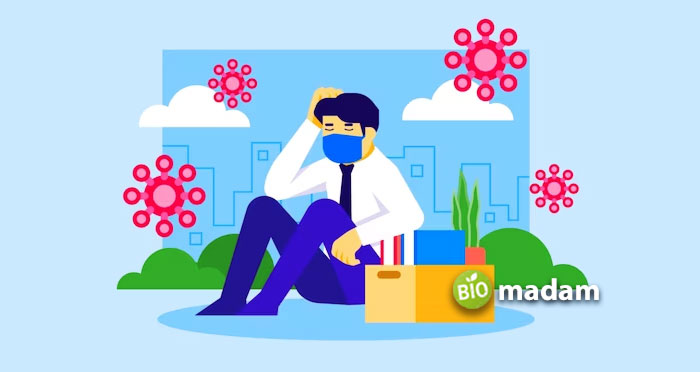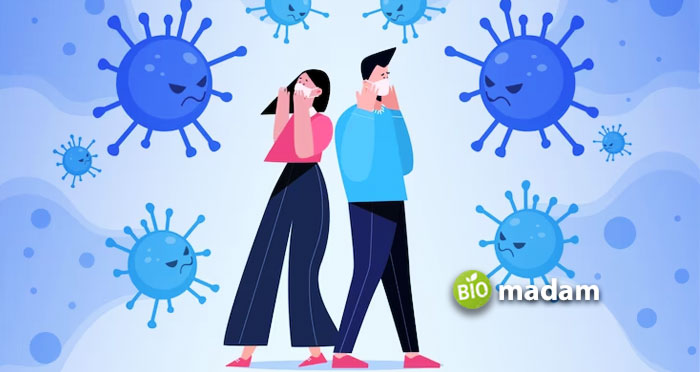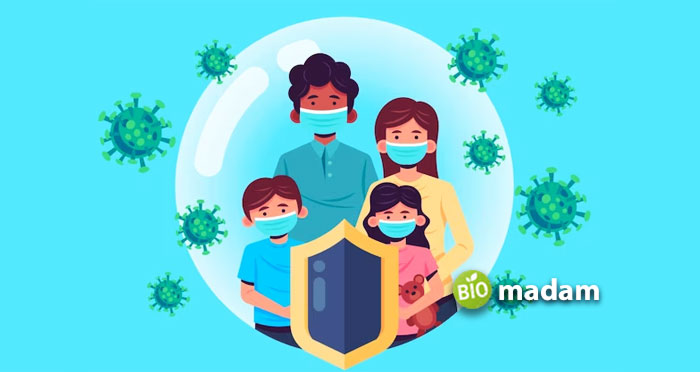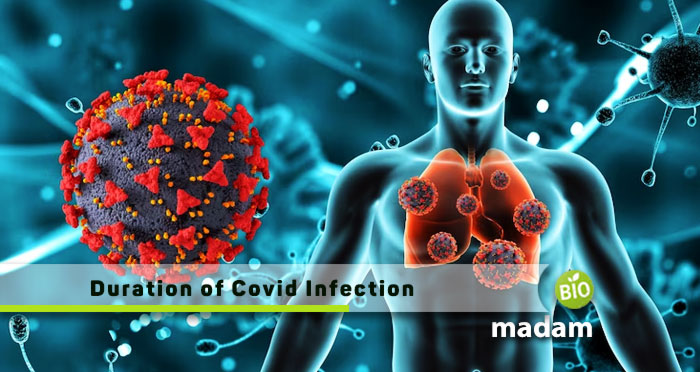Recently updated on April 6th, 2023 at 06:05 am
You must have experienced bacterial or viral infections at any time in your life, but things worsen when the covid appeared in late 2019. This pandemic has brought about several questions and concerns, and one of them is how long a person is contagious with Coronavirus. Knowing this information is crucial in controlling the spread of the virus. In this article, we will explore the duration of contagiousness in COVID-19 patients. Let us first understand what is COVID.
What is COVID-19?
COVID-19 is a contagious respiratory disease that results from the severe acute respiratory syndrome coronavirus 2 (SARS-CoV-2). It was first identified in Wuhan, China, in December 2019 and has since spread to become a global pandemic. The main mode of transmission of COVID-19 is through respiratory droplets, which are released when an infected person talks, coughs, or sneezes. Another way to contract the virus is by touching a surface contaminated with the virus and then touching one’s mouth, nose, or eyes.
The signs and symptoms of COVID-19 can range from mild to severe and may include fever, cough, shortness of breath, fatigue, body aches, and loss of smell or taste. In severe cases, COVID-19 can lead to pneumonia, acute respiratory distress syndrome, and death. However, people who win against the infection develop natural immunity for a few months. Centers for Disease Control and Prevention suggest public health measures such as wearing masks, social distancing, frequent handwashing, and vaccination to prevent COVID-19 in surrounding people.
How Long are you Contagious with Corona Virus?
The highly contagious COVID-19 is caused by the novel coronavirus, which can be transmitted by individuals even if they are asymptomatic. The duration of the contagious period varies with different circumstances and factors such as age, gender, weakening of different types of immunity, etc. There is no definitive answer that is universally applicable, according to scientists.
This article aims to describe the duration of COVID-19 contagiousness based on individual factors, as well as to offer guidance on ways to safeguard others and detail the symptoms and recovery periods associated with the disease.

Corona Virus Incubation Period
The incubation period is the time between exposure to a disease-causing pathogen (such as a virus or bacterium) and the onset of symptoms. During this time, the pathogen is multiplying within the body, and the immune system is responding to the infection. The length of the incubation period can vary depending on the antigen and pathogen, the individual’s active or passive immunity, and other factors.
In the case of COVID-19, the incubation period ranges from 2 to 14 days, with an average of 5-6 days. Knowing the incubation period of a disease or infection is essential for identifying and controlling its spread, as individuals can transmit the disease even before they show symptoms.
When are you most Contagious?
According to infectious disease experts, the period when most COVID-19 patients are highly contagious is typically right before and right after the onset of symptoms, based on their estimation. A review indicated that you are most contagious during the first week of your exposure to the illness. However, it is challenging to detect contagiousness in asymptomatic individuals as they might be unaware of having Covid-19. Similarly, it is also difficult to diagnose covid infection in pre-symptomatic patients. Individuals who do not exhibit symptoms but later develop them are considered pre-symptomatic.
According to a study at ScienceDirect, ‘Viral dynamics in asymptomatic patients with COVID-19,’ both asymptomatic and pre-symptomatic individuals can shed the virus and spread COVID-19. The study involved 31 people hospitalized for different reasons who tested positive for COVID-19 but were asymptomatic. Out of these individuals, nine never showed any symptoms, while the remaining 22 eventually developed them. The study found that the duration of the shedding of potentially infectious viral particles by the participants ranged from 5 to 16 days.
How long are you Contagious with COVID Omicron?
Currently, Omicron is the most prevalent strain of COVID-19 in the United States, and it may have a shorter incubation period than earlier variants. While there is no definitive answer, some experts who have examined Omicron and physicians who have cared for patients infected with it estimate that its incubation period may be approximately 3 days.
Although the Delta variant of COVID-19 was previously considered highly contagious, Omicron is now thought to be even more so. However, health professionals are closely monitoring the severity of the illness it causes and the effectiveness of available vaccines and treatments against it.
How Long do you Need to Stay Isolated with COVID?
To prevent the spread of COVID-19, it is recommended to isolate from others when a person develops symptoms or tests positive for the virus. The minimum period of isolation can differ based on various factors, as outlined by the Centers for Disease Control and Prevention (CDC). It is important to note that when counting isolation days, the day of symptom onset or positive test result is considered Day 0, and the following day is considered Day 1.

Asymptomatic
An individual can test positive for COVID-19 but remain asymptomatic throughout the illness. In such cases, individuals without symptoms can discontinue their isolation period after 5 days have passed since the day of their positive test result. It is important to note that Day 0 is considered the day of the positive test, and Day 1 is the subsequent day.
Following the completion of isolation, individuals are advised to wear a high-quality mask both indoors and in public until Day 10. If two rapid antigen tests, taken 48 hours apart, come back negative, individuals may consider removing their mask sooner. However, if symptoms develop, the isolation period resets to Day 0 and must begin anew.
Mild Symptoms
Individuals who exhibit mild symptoms of COVID-19 are required to remain in isolation for at least 5 days. Day 0 is considered the first day of symptoms, and the following day is designated as Day 1. Once Day 5 is reached, individuals may resume interacting with others if they have not had a fever for 24 hours and have not taken fever-reducing medication. Additionally, their other symptoms must be improving.
Individuals experiencing a loss of taste or smell as their only remaining symptom are not required to continue isolating. It is important to wear a high-quality mask at home and in public until Day 10 after ending isolation. If a person is unable to wear a mask, such as young children, they should continue isolating until Day 10. Following the end of isolation, individuals with mild symptoms can consider removing their mask sooner if they have received two negative COVID-19 tests, taken 48 hours apart.
Moderate Symptoms
The CDC defines moderate symptoms of COVID-19 as those that include breathing problems or shortness of breath. When a person with moderate or severe COVID-19 is hospitalized, it is classified as a severe case. These individuals should isolate themselves for at least 10 days, starting from day 0, which is the day of symptom onset, with the following day being day 1. Individuals who have been hospitalized for COVID-19 should consult with their doctor before discontinuing isolation.
Preventions from COVID-19
Here are some tips on how to protect others from COVID-19:
Wear a Mask
Wearing a mask is one of the most effective ways to protect others from COVID-19. The mask helps prevent the spread of respiratory droplets that may contain the virus. When worn correctly, masks cover both the mouth and nose, and they should be washed or replaced regularly.
Practice Social Distancing
Social distancing refers to maintaining at least 6 feet of distance between yourself and others. This helps reduce the chances of coming into contact with respiratory droplets that may contain the virus. It is particularly important to practice social distancing in crowded public spaces or when interacting with people outside of your household.
Wash Your Hands Frequently
Washing your hands regularly is another effective way to protect others from COVID-19. Clean your hands with soap and water for at least 20 seconds. If you don’t have access to soap and water, use a hand sanitizer that contains a minimum of 60% alcohol.

Stay Home if You are Sick
If you are feeling unwell or have symptoms of COVID-19, stay home and avoid close contact with others. This helps prevent the spread of the virus to others who may be more vulnerable to severe illness.
Cover Your Mouth and Nose While Coughing or Sneezing
Cover your mouth and nose with a tissue or the inside of your elbow when you cough or sneeze. This helps prevent respiratory droplets that may contain the virus from spreading to others.
Clean and Disinfect High-Touch Surfaces
Frequently clean and disinfect high-touch surfaces, such as doorknobs, light switches, and countertops. This helps kill any potential virus particles that may be present on these surfaces.
Summary
In general, individuals with COVID-19 are believed to be most contagious before and shortly after the onset of symptoms. However, there are some cases in which individuals may not experience any symptoms at all, yet still be able to spread the SARS-CoV-2 virus to others. It is crucial to take measures to limit the spread of SARS-CoV-2 and COVID-19. One effective way is by wearing a face mask, improving indoor air circulation, and relocating indoor activities outside. These precautions can significantly minimize the risk of transmitting the virus.
Keeping up with COVID-19 vaccines and boosters can also help prevent severe illness and hospitalization. It is important to follow the guidelines for isolation and never assume that the lack of symptoms indicates an absence of COVID-19.

Meet me; I am Paulina Zaniewska, who’s more hooked on providing the best health blog. I’ve always been so determined to compete as a nutritionist, and here I am, done with a Master’s in food technology. My brilliant performance throughout encouraged me to help people.

